‘Climb up, and seize him by the toes!—all studious as he sits,—
‘And pull him down,—and chop him into endless little bits!
‘Then mix him with your Onion, (cut up likewise into Scraps,)—
‘When your Stuffin’ will be ready—and very good: perhaps.’
Those two old Bachelors without loss of time
The nearly purpledicular crags at once began to climb;
And at the top, among the rocks, all seated in a nook,
They saw that Sage, a reading of a most enormous book.
‘You earnest Sage!’ aloud they cried, ‘your book you’ve read enough
in!—
‘We wish to chop you into bits to mix you into Stuffin’!’—
But that old Sage looked calmly up, and with his awful book,
At those two Bachelors’ bald heads a certain aim he took;—
And over Crag and precipice they rolled promiscuous down,—
At once they rolled, and never stopped in lane or field or town,—
And when they reached their house, they found (besides their want
of Stuffin’,)
The Mouse had fled;—and, previously, had eaten up the Muffin.
They left their home in silence by the once convivial door.
And from that hour those Bachelors were never heard of more.
THE PELICANS.
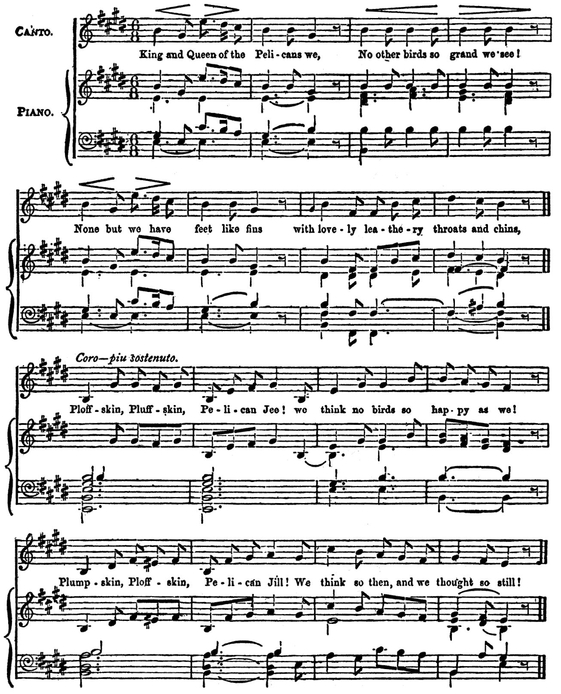
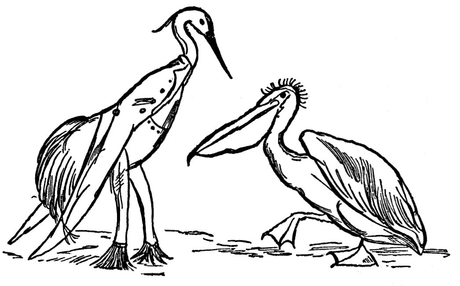
THE PELICAN CHORUS
King and Queen of the Pelicans we;
No other Birds so grand we see!
None but we have feet like fins!
With lovely leathery throats and chins!
Ploffskin, Pluffskin, Pelican jee!
We think no Birds so happy as we!
Plumpskin, Ploshkin, Pelican jill!
We think so then, and we thought so still!
We live on the Nile. The Nile we love.
By night we sleep on the cliffs above;
By day we fish, and at eve we stand
On long bare islands of yellow sand.
And when the sun sinks slowly down
And the great rock walls grow dark and brown,
Where the purple river rolls fast and dim
And the Ivory Ibis starlike skim,
Wing to wing we dance around,—
Stamping our feet with a flumpy sound,—
Opening our mouths as Pelicans ought,
And this is the song we nightly snort;—
Ploffskin, Pluffskin, Pelican jee,—
We think no Birds so happy as we!
Plumpskin, Ploshkin, Pelican jill,—
We think so then, and we thought so still.
Last year came out our Daughter, Dell;
And all the Birds received her well.
To do her honour, a feast we made
For every bird that can swim or wade.
Herons and Gulls, and Cormorants black,
Cranes, and Flamingoes with scarlet back,
Plovers and Storks, and Geese in clouds,
Swans and Dilberry Ducks in crowds.
Thousands of Birds in wondrous flight!
They ate and drank and danced all night,
And echoing back from the rocks you heard
Multitude-echoes from Bird and Bird,—
Ploffskin, Pluffskin, Pelican jee,
We think no Birds so happy as we!
Plumpskin, Ploshkin, Pelican jill,
We think so then, and we thought so still!
Yes, they came; and among the rest,
The King of the Cranes all grandly dressed.
Such a lovely tail! Its feathers float
Between the ends of his blue dress-coat;
With pea-green trowsers all so neat,
And a delicate frill to hide his feet,—
(For though no one speaks of it, every one knows,
He has got no webs between his toes!)
As soon as he saw our Daughter Dell,
In violent love that Crane King fell,—
On seeing her waddling form so fair,
With a wreath of shrimps in her short white hair.
And before the end of the next long day,
Our Dell had given her heart away;
For the King of the Cranes had won that heart,
With a Crocodile’s egg and a large fish-tart.
She vowed to marry the King of the Cranes,
Leaving the Nile for stranger plains;
And away they flew in a gathering crowd
Of endless birds in a lengthening cloud.
Ploffskin, Pluffskin, Pelican jee,
We think no Birds so happy as we!
Plumpskin, Ploshkin, Pelican jill,
We think so then, and we thought so still!
And far away in the twilight sky,
We heard them singing a lessening cry,—
Farther and farther till out of sight,
And we stood alone in the silent night!
Often since, in the nights of June,
We sit on the sand and watch the moon;—
She has gone to the great Gromboolian plain,
And we probably never shall meet again!
Oft, in the long still nights of June,
We sit on the rocks and watch the moon;—
——She dwells by the streams of the Chankly Bore,
And we probably never shall see her more.
Ploffskin, Pluffskin, Pelican jee,
We think no Birds so happy as we!
Plumpskin, Ploshkin, Pelican jill,
We think so then, and we thought so still!
NOTE.—The Air of this and the following Song, by Edward Lear; the Arrangement for the Piano by Professor Pomè, of Sanremo, Italy.
THE YONGHY BONGHY BÒ.
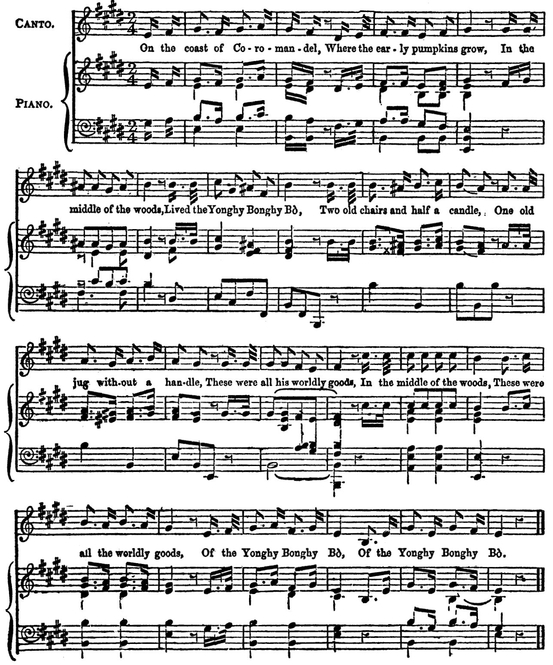
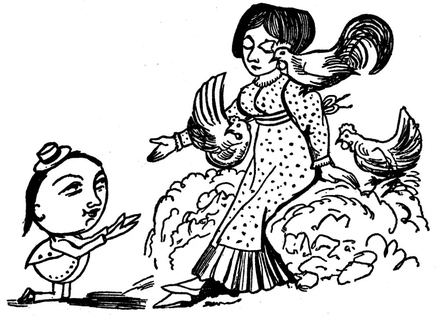
THE COURTSHIP OF THE YONGHY-BONGHY-BO
I
On the Coast of Coromandel
Where the early pumpkins blow,
In the middle of the woods
Lived the Yonghy-Bonghy-Bò.
Two old chairs, and half a candle,—
One old jug without a handle,—
These were all his worldly goods:
In the middle of the woods,
These were all the worldly goods,
Of the Yonghy-Bonghy-Bò,
Of the Yonghy-Bonghy-Bò.
II
Once, among the Bong-trees walking
Where the early pumpkins blow,
To a little heap of stones
Came the Yonghy-Bonghy-Bò.
There he heard a Lady talking,
To some milk-white Hens of Dorking,—
“Tis the Lady Jingly Jones!
‘On that little heap of stones
‘Sits the Lady Jingly Jones!’
Said the Yonghy-Bonghy-Bò,
Said the Yonghy-Bonghy-Bo.
III
‘Lady Jingly! Lady Jingly!
‘Sitting where the pumpkins blow,
‘Will you come and be my wife?’
Said the Yonghy-Bonghy-Bò.
‘I am tired of living singly,—
‘On this coast so wild and shingly,—
‘I’m a-weary of my life:
‘If you’ll come and be my wife,
‘Quite serene would be my life!’—
Said the Yonghy-Bonghy-Bò,
Said the Yonghy-Bonghy-Bò.
IV
‘On this Coast of Coromandel,
‘Shrimps and watercresses grow,
‘Prawns are plentiful and cheap,’
Said the Yonghy-Bonghy-Bò.
‘You shall have my Chairs and candle,
‘And my jug without a handle!—
‘Gaze upon the rolling deep
(‘Fish is plentiful and cheap)
‘As the sea, my love is deep!’
Said the Yonghy-Bonghy-Bò,
Said the Yonghy-Bonghy-Bò.
V
Lady Jingly answered sadly,
And her tears began to flow,—
‘Your proposal comes too late,
‘Mr. Yonghy-Bonghy-Bò!
‘I would be your wife most gladly!’
(Here she twirled her fingers madly,)
‘But in England I’ve a mate!
‘Yes! you’ve asked me far too late,
‘For in England I’ve a mate,
‘Mr. Yonghy-Bonghy-Bò!
‘Mr. Yonghy-Bonghy-Bò!’
VI
‘Mr. Jones—(his name is Handel,—
‘Handel Jones, Esquire, & Co.)
‘Dorking fowls delights to send,
‘Mr. Yonghy-Bonghy-Bò!
‘Keep, oh! keep your chairs and candle,
‘And your jug without a handle,—
‘I can merely be your friend!
‘—Should my Jones more Dorkings send,
‘I will give you three, my friend!
‘Mr. Yonghy-Bonghy-Bò!
‘Mr. Yonghy-Bonghy-Bò!’
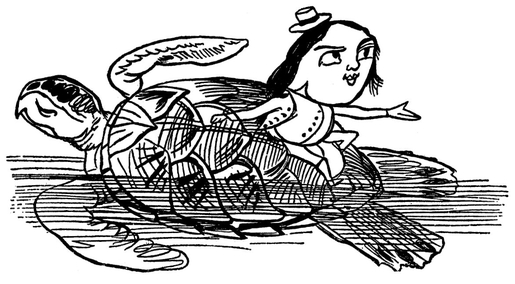
VII
‘Though you’ve such a tiny body,
‘And your head so large doth grow,—
‘Though your hat may blow away,
‘Mr. Yonghy-Bonghy-Bò!
‘Though you’re such a Hoddy Doddy—
‘Yet I wish that I could modi-
‘fy the words I needs must say!
‘Will you please to go away?
‘That is all I have to say—
‘Mr. Yonghy-Bonghy-Bò!
‘Mr. Yonghy-Bonghy-Bò!’
VIII
Down the slippery slopes of Myrtle,
Where the early pumpkins blow,
To the calm and silent sea
Fled the Yonghy-Bonghy-Bò.
There, beyond the Bay of Gurtle,
Lay a large and lively Turtle;—
‘You’re the Cove,’ he said, ‘for me
‘On your back beyond the sea,
‘Turtle, you shall carry me!’
Said the Yonghy-Bonghy-Bò,
Said the Yonghy-Bonghy-Bò.
IX
Through the silent-roaring ocean
Did the Turtle swiftly go;
Holding fast upon his shell
Rode the Yonghy-Bonghy-Bò.
With a sad primæval motion
Towards the sunset isles of Boshen
Still the Turtle bore him well.
Holding fast upon his shell,
‘Lady Jingly Jones, farewell!’
Sang the Yonghy-Bonghy-Bò,
Sang the Yonghy-Bonghy-Bò.
X
From the Coast of Coromandel,
Did that Lady never go;
On that heap of stones she mourns
For the Yonghy-Bonghy-Bò.
On that Coast of Coromandel,
In his jug without a handle
Still she weeps, and daily moans;
On that little heap of stones
To her Dorking Hens she moans,
For the Yonghy-Bonghy-Bò,
For the Yonghy-Bonghy-Bò.
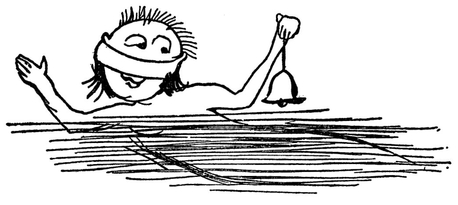
THE POBBLE WHO HAS NO TOES
I
The Pobble who has no toes
Had once as many as we;
When they said, ‘Some day you may lose them all;’—
He replied,—‘Fish fiddle de-dee!’
And his Aunt Jobiska made him drink,
Lavender water tinged with pink,
For she said, ‘The World in general knows
There’s nothing so good for a Pobble’s toes!’
II
The Pobble who has no toes,
Swam across the Bristol Channel;
But before he set out he wrapped his nose,
In a piece of scarlet flannel.
For his Aunt Jobiska said, ‘No harm
‘Can come to his toes if his nose is warm;
‘And it’s perfectly known that a Pobble’s toes
‘Are safe,—provided he minds his nose.’
III
The Pobble swam fast and well
And when boats or ships came near him
He tinkledy-binkledy-winkled a bell
So that all the world could hear him.
1 comment